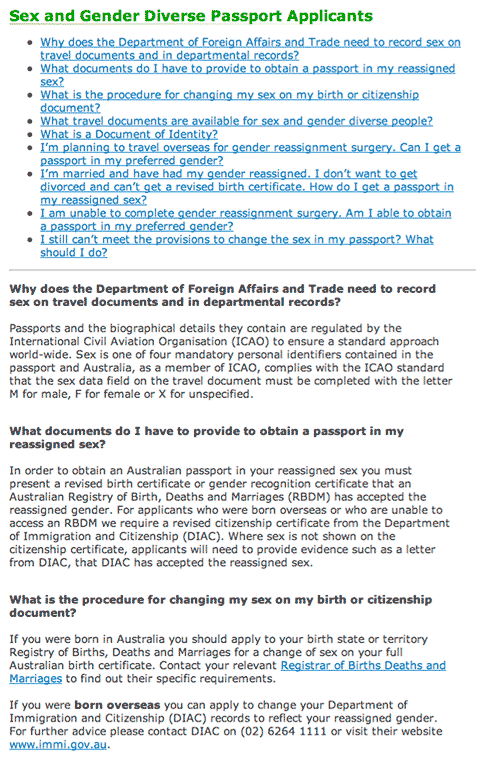Signs of reform in the Australian Passport Office
We are pleased to report that the Australian Passport Office, in the Department of Foreign Affairs and Trade, has made first steps in reforming its practices in relation to what it calls ‘sex and gender diverse’ people. We thank them for this.

It should be noted, though that DFAT’s new position is essentially a return to the more humane and realistic policy that existed before former Foreign Minister Alexander Downer instituted a ministerial directive denying passports to those whom he labelled ‘transgender’.
At last two intersex people were denied passports under Downer’s ministerial directive after they were falsely labelled as ‘transgender’. Intersex people were effectively punished simply for being born intersex. Both intersex Australians eventually received their passports, after a great deal of anguish, frustration and expense.
Indirect Outcomes
In one instance, the byzantine difficulties associated with the experience indirectly led to the Inner City Legal Centre (ICLC) in Sydney setting up its world’s first intersex legal service.
It also almost resulted in the individual and the ICLC being forced to fight all over again exactly the same kind of case against DFAT that Grace Abrams had already fought and won in the Administrative Appeals Tribunal.
It had come to that partly due to Downer’s ministerial directive and partly because of the British Records Office’s tendency to misplace divorce records. The individual concerned was long divorced at the time she was refused a passport, but could not furnish proof of divorce due to her records being misplaced in the UK. Proof was eventually provided by the British Records Office some time afterwards.
Thanks & Suggestions for DFAT
We thank DFAT for making public its policy on ‘sex and gender diverse’ people. to various passport offices in the past about passports for intersex people yielded widely varying answers from a number of different DFAT officers, and it was impossible to gauge the actual policy until now.
There remains room for improvement.
The page’s first answer includes this phrase…
… the ICAO standard that the sex data field on the travel document must be completed with the letter M for male, F for female or X for unspecified.
The ICAO is the International Civil Aviation Authority, and the regulation permitting a choice of M, F or X has stood for some decades now. X has been interpreted to refer to intersex people, or at least those intersex people who choose not to be identified as male or female.
Previous enquiries at the APO about Australian intersex people’s right to an X yielded the reply that it is only permitted when one has been classified as being of unspecified or indeterminate sex by the doctor who attended one’s birth. Australian doctors’ extreme reluctance to do so, preferring instead to assign the baby as male or female regardless of whether non-consensual surgery was performed or not. We only know of two Australians whose birth certificates record either non-specific designation, both in the state of Victoria which permits such designation on a birth certificate.
We believe that intersex and other people who choose to be identified with an X on their passport should be permitted to do so, regardless of their attending birth physician’s beliefs and practices at the time, and that a policy and application procedure should be formulated and publicised.
However, DFAT’s page does not go into details or specifics on X. We ask that DFAT now clarifies this oversight.
We are glad to help DFAT in any way that we can.
You must be logged in to post a comment.